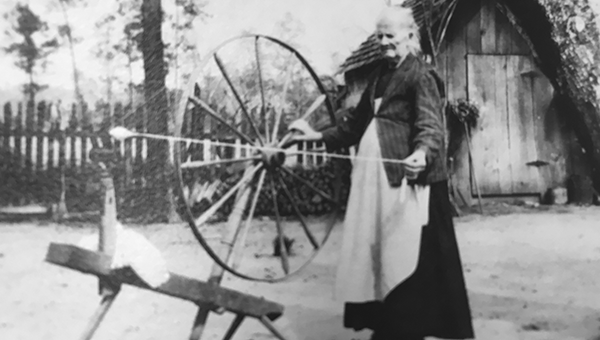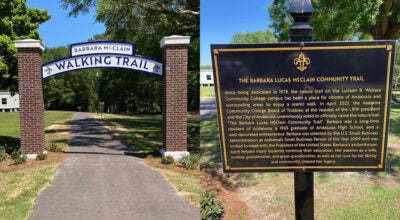Remember when: Depression times in South Alabama
Published 12:00 am Saturday, September 15, 2018

- Times were hard in the Depression in south Alabama.
Thinking about the books in my home library, I was reminded of one on the shelf written by Alma Lou Straughn Hall of Brewton – “RABBIT STEW.” This week, I took it down to browse through it again. Mrs. Hall grew up in Deer Range, Conecuh County and wrote and illustrated a collection of stories about her growing up days in the 1920s and 1930s. Some of the titles of these stories were “The Old Screen Door,” “The Teacher Taught More Than 3 R’s,” “Ghost Stories, Feather Beds, and Pee Buckets,” “Quilting Bee,” “The Button Box,” “Homemade Tooth Brushes,” “The Out House,” “ Saturday Night Bath,” “The Ice Man,” “Taffy Candy Pull,” “Churning Milk for Butter,” and “The Importance of a Cow Patty.”
The story called “Depression Times” caught my interest once more. It reminds me a little of one of O. Henry’s short stories, “The Gift of the Magi.” Let me quote some lines from this memory of hers that merits preserving.
“My grandson wanted to know if I went hungry during the Depression. ‘No, son,’ I laughed. ‘We had enough to eat at all times since we lived on a farm out in the country where we raised fruits, berries, nuts, vegetables, and Dad butchered hogs, beef, chickens, and caught fish from the creeks and branches.’”
“There was not much money stirring at that time. In 1929 Mom and Dad had $400. in the bank which was all the family savings. They had bought the farm, a frame house, and 150 acres of land where we were living. They put all the money from surplus eggs, cows, turkeys, chickens, nuts, milk, and butter in the bank to help meet the yearly payment of $65 to the Federal Land Bank. Since Dad wanted to pay off the farm as soon as possible, the family went without many things – only necessities not luxury items like new clothes, farm equipment, and new shoes. The family pinched every penny to build up their savings account.”
“Only $500. was needed to own the farm, lock, stock, and barrel! There was talk around town that the Farmers Bank was about to go broke so Dad went and talked to the bank president who assured him that the bank was not going to go broke and things would settle down soon. He advised Dad to leave his money in the bank for if he drawed his money out, it might make people nervous.”
“A few weeks later, the bank closed. Dad rode to town where he saw a big padlock on the bank door. He joined the crowd that mingled and growled about the closing. Their money was gone and there was not anything they could do to get their money back.”
“Dad was never one to complain, but he said, ‘Mama, what are we going to do? We have lost all our money. We were so close to paying off the farm and being dirt free.’”
“Dad walked out the front door and sat in the swing, cupped his head between his hands, and groaned and moaned the rest of the day and into the night. Mama and the older children tried to take care of the chores inside and outside doing the best they could. Dad just sat motionless grieving. That went on for days.”
“It was time to start a garden and break the fields to plant a crop. After breakfast, Dad told Mama, ‘I’m taking Kate and Emma (the mules) and the farm wagon to town and sell them at the general store. The owner has always admired that wagon and mules.’”
“Mama spoke up, ‘There is no need to do that. We need the mules for plowing the garden and fields. Also, for pulling the farm wagon to go to church and town. My father gave me his gold pocket watch to sell in case of an emergency. I think that emergency has visited our family.’ Dad put his arms around Mama and eight little girls. Yes, I knew love had outlived the Depression!”
Another story was donated to the Three Notch Museum on Historic Central Street. Mrs. Gem Hunter Kendall was born in Covington County near Red Level. Her husband Charles Floyd Kendall who died in 1941 was a farmer and sawmiller of the Mobley Creek community. Their children (according to Mrs. Kendall’s obituary in the 1966 Andalusia Star News) were Mrs. Jess Dixon, Mrs. Wilbur Simmons, Mrs. Jewel Faulkenberry, Mrs. James W. Thornton of Montgomery, Mrs. R. B. Reid of Birmingham, Dr. Gordon C. Kendall of Montgomery, and Dr. Hunter E. Kendall of Birmingham.
So this story to follow is about Depression times right here in Covington County and was written in lovely penmanship by Hunter E. Kendall.
“Memoirs of Hunter E. Kendall – I have no sympathy for today’s teenagers’ complaints – ‘There’s nothing for us to do.’ During the early 1930s Tom Kendall organized and put together a baseball team. We called ourselves the Pea Ridge team. There was no YMCA, United Way, or other organizations to sustain (and support) us. We somehow found a way to purchase gloves, balls, and bats. We played on Saturday afternoons during the summer after school was out.”
“As soon as I was large enough to shuck, shell, sack, and take corn to grist mills, it became my responsibility. One day while riding one of our mules with a sack of corn balanced on its withers, a dog came running and barking at us. The mule bucked and threw me off spraining my back. A woman came out of the house and offered to rub my back with liniment. I wouldn’t have any part of that!”
“At another grist mill I was running my hand deep into a barrel of shelled corn the miller had taken from batches of corn for grinding it into meal. Lo! Deep down in the barrel, my hand struck a quart bottle. I pulled it up and revealed a bottle of moonshine whiskey. I was lucky the miller was busy sacking up meal and never knew that I had discovered one of his secrets. I kept my mouth shut.”
“For soap making, Mama would save the grease from cooking, mix it with ‘Red Devil’ Lye, and I don’t know what else. Pour it all in a metal wash pot and cook it for a while stirring it often. ‘Always stir it to the right,’ she would say. ‘Never stir to the left, because that is bad luck!’ She used this lye soap to wash clothes.”
“During a part of the Great Depression, Circa 1929-1930, when a great number of banks failed, I had a $75.00 savings account in an Andalusia bank. Later after the bank failure, they finally settled up with me and I received about six or eight dollars.”
“In the early 1920s before I was old enough to be left at home alone, Mama and Papa had occasion to be away from home during the day. So they hired this woman to stay at home and look after me. At that time, we were on a rural telephone system. All others were on the line and could pick up their receivers anytime and listen in on what was being said. One day, I pulled up a chair to the phone and turned up the crank and cranked three longs, our ring. I wanted to hear all the receivers coming off the hooks who wanted to listen in. Well, this woman was not familiar with telephones and she sternly said to me, ‘Fix it back!’ She almost whipped me.”
“During hunting season, there was nothing more important to Papa than hunting. He would take me squirrel hunting along with ‘Ole Ruff,’ our dog that helped raise me. He would say to me, ‘When we get 25 (squirrels), we’re going to go home.’ It was a sport but also a means to put food on the table. We never killed anything just for the sport of killing. “
“In the days before REA, the killing of hogs and curing of meat was at best a gamble on the weather. Unfortunately, hog killing and hunting season intermingled. Sometimes during the cold weather necessary to cure meat, Papa was too busy hunting to spend time killing hogs and curing meat with the sometimes result of meat spoiling when the slaughter was late in the winter.”
“We never set foot in a meat market. The only time we ever had any beef to eat was when someone in the community would slaughter a cow or steer and would come around house to house in a one or two-horse wagon with the meat in wash tubs covered with fresh green pine straw to keep the flies off.”
Yes, readers, “The pen is mightier than the sword.” I am so glad that these two South Alabama citizens wrote their memories down on paper so we could all Remember When. Many thanks are due Nan Gafford from down the Brooklyn Road and Sharon Hunter Harper from Loango who remembered “Aunt Gem” and the Kendalls of Mobley Creek. Some of that family is buried in the Smith Cemetery. As always, thanks to Linda Grimes Harrell in the genealogy room at the Andalusia Public Library for helping to dig to find history.
Sue Bass Wilson, AHS Class of 1965, is a real estate broker and long-time member of the Covington Historical Society. She can be reached at suebwilson47@gmail.com.





